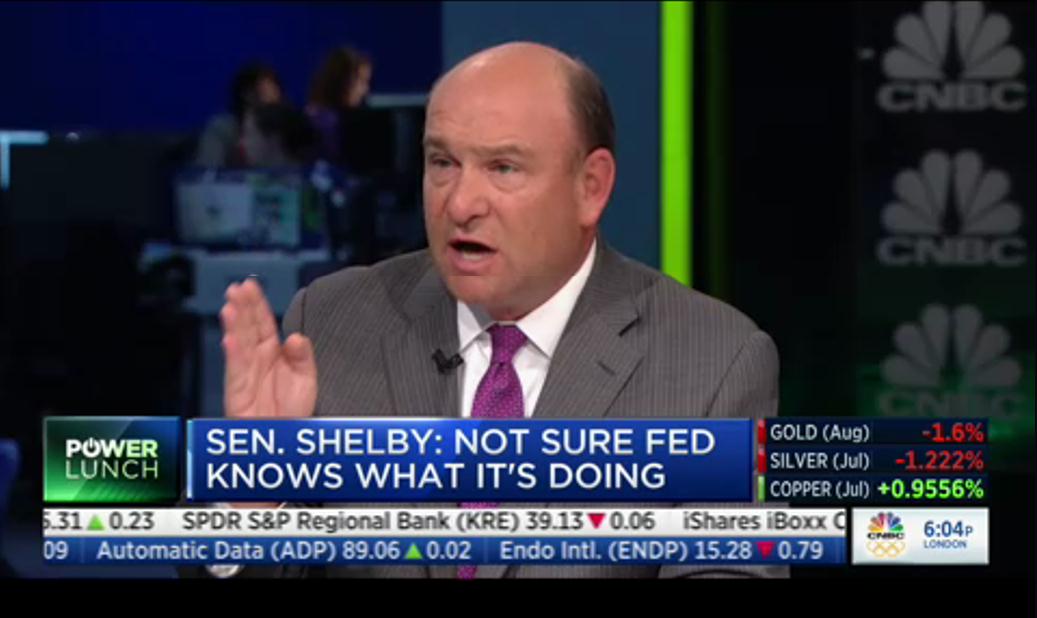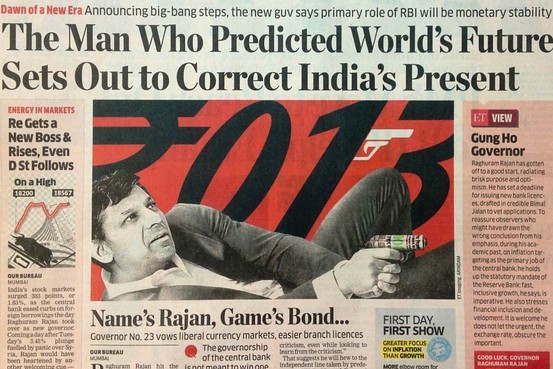Update & Appeal on Saturday, June 25, 2016 – Our fears about the global economy are being realized at least in part. Yesterday’s steep & fearful decline in world’s markets is an indication of what might lie ahead of the world economy & Indian economy. While we stand by everything in the article below, discretion is the better part of valor today. We feel, in this period, Dr. Rajan is the best choice for a navigator through these turbulent seas. So we have issued a Joint Appeal today to RBI Governor Rajan, Finance Minister Jaitley & Prime Minister Modi.
The appointment & reappointment of the Chair of the US Federal Reserve is a prerogative of the President of the United States. Not only is the decision up to the President but so is the timing and venue of the announcement. Can you imagine a sitting Fed Chair sending a note to Fed colleagues & staffers about her/his decision to return to academics at the end of the Chair’s term without first informing or clearing it with the President?
It would be unthinkable to imagine any Fed Chair acting that way. And any Chair who acted so would be condemned by all in America’s political & economic spectrum. Such an act would be deemed to be an extraordinarily selfish, boorish, & disrespectful usurpation of the President’s authority.
Yet, thats is exactly what Raghuram Rajan, Governor of the Reserve Bank of India, did in his message to RBI staff on June 18, 2016. Usually it is the Head of State who pats a Central Banker on the back for a job well done & thanks the departing Central Banker. But these ethical norms are apparently not for Dr. Rajan. Because in the initial paragraphs, Rajan patted himself on his back profusely & took credit for India’s economic growth:
- “Today, I feel proud that we at the Reserve Bank have delivered on all these proposals … Today, we are the fastest growing large economy in the world, having long exited the ranks of the Fragile Five … We have done far more than was laid out in that initial statement … “
After such self-praise, Rajan delivered his jolt:
- “I am an academic and I have always made it clear that my ultimate home is in the realm of ideas … I want to share with you that I will be returning to academia when my term as Governor ends on September 4, 2016. I will, of course, always be available to serve my country when needed.”
Reportedly Rajan sent out this note to the RBI staff without informing his Prime Minister or his Finance Minister. Read what even the habitually anti-Modi Huffington Post wrote:
- “When Rajan decided to leave, he did so without warning and on his own terms: in a sign of growing tensions he did not inform top members of the government before releasing an open letter to staff on Saturday, a move that took investors and the government by surprise. “
There is absolutely no excuse at all for this enormous breach of protocol, ethics, & norms of accepted behavior by RBI Governor Rajan. And it looks like a move designed to damage the Indian Rupee & destabilize Indian markets. Rajan knew that the entire world was awash in deep concern about Brexit and its enormous potential to cause havoc in global financial markets. And last Saturday, the day Rajan sent out his note, was the day the Brexit campaign resumed after a two-day suspension.
Why didn’t Rajan wait for another week & let the Brexit issue be settled before personally creating instability in Indian markets? Was Rajan deliberately trying to create a market convulsion just before Brexit to force the Indian Prime Minister & Finance Minister to beg him to stay on for another term? If not, why did Rajan add “I will, of course, always be available to serve my country when needed” in his note to RBI staff?
If our rank speculation is true, then Rajan’s act could be deemed as an act of treason in our opinion, treason being defined as “an action of betraying one’s country“. If not, his act would still remain an act of personal spite taken on the most anxiety filled weekend of this year without any concern for the turmoil it could trigger in India’s financial markets.
2. A man & his ego greater than his country?
Indian society is at a delicate stage of its societal development, a stage in which “intellectual” credentials are given far greater importance than necessary. And an Indian “intellectual” who is acclaimed by the western world is regarded as a luminary, not just a normal luminary but a crown jewel of Indian society. This may be hard for most Americans to understand. After all, no other central bank can boast of a deep team of respected & credentialed Ph.D. economists as the US Federal Reserve. But these Fed economists are only respected, never idolized.
In contrast, Rajan was idolized by Indian media and placed on a pedestal as the savior of Indian economy. He was portrayed & worshiped as the only economist who had identified the housing crisis of 2008. The Indian media praised his unique physical stamina & his competitive spirit and termed him the James Bond of economics.
This crazy “Name’s Rajan, Game’s Bond” stuff seemed to have gone to Rajan’s head. Look what he said in explaining his reasons for a repo rate cut on September 29, 2015:
Can any one imagine Janet Yellen or Alan Greenspan pretending to be James Bond in explaining their interest rate decisions? No one in any developed economy would tolerate such unbridled arrogance from a Central Banker.
But Indian media was infatuated with him and portrayed him as India’s indispensable man. And that kool-aid went to Rajan’s head, we think.
3. Was Rajan important for India?
We have followed Rajan since his days at Univ. of Chicago & via his professorial appearances on American TV. We always respected his expertise. We became much more positive towards his monetary policy actions as RBI Governor. We felt he was a really important stabilizing factor in this period of Quantitative Easing & Negative Interest Rate policies of American, European & Japanese Central Banks. Rajan was intellectually opposed to such measures and was respected for this opposition by global investors. And that, we felt, would protect the Indian Rupee from panicky outflows by global investors.
That is why we wrote a clear cut defense of Rajan on August 22, 2015 titled Finance Minister Jaitley, Leave RBI Governor Rajan Alone.
There was another reason for our determined support for Rajan. Many in India bemoaned the fact that they had a Macro Economics driven RBI Governor when they felt they should have a Micro Economics driven RBI Governor. Our views were & remain different.
Global economies today are more driven by massive gyrations of inflows & outflows of capital by global investors. There is enormous concern about the unconventional & possibly dangerous monetary policy adventures like negative interest rates. A medium sized economy like India’s with a small reserve of $360 billion can be easily buffeted, we felt.
This is not an environment for a micro economics driven monetary policy. As we wrote in our defense of Rajan:
- ” … there is a time to play defense and a time to play offense. This is most definitely the time to play strong resolute defense. That is what Governor Rajan is doing and doing very well“
But there is a difference between being very important and considering himself as above his government and country.
4. Was Rajan being stupid or merely immature?
Didn’t Rajan realize that the campaign against him by Dr. Swamy was really a broader campaign against the pro-American leanings of Prime Minister Modi? And that he was merely a weapon to be used by Swamy? Such campaigns are best handled by letting them crest while you remain patiently quiet, calm, & serene as PM Modi is doing. After all September is three months away, a life time in Indian politics. So Rajan should have kept quiet & let PM Modi come to his decision.
Rajan would have won in both cases. Had PM Modi reappointed him, he would have obviously won. Had PM Modi decided to not reappoint him, Rajan would have won both a moral & political victory. We were betting on the former. A better relationship with America is a linchpin of PM Modi’s economic & foreign policy and he could not be seen as kowtowing to Swamy. And PM Modi is pragmatic at his core. He would have chosen discretion over valor and reappointed Rajan in due course, we felt.
But Rajan stupidly & churlishly pre-empted the political strategy and, in a fit of almost childish spite, threw in his hand.
5. Rajan, the typical Indian? – James Bond in India, Spaghetti on US TV?
Check out Indian guests on American TV, especially on American Financial Networks. They invariably appear shy & diffident. It is as if they don’t have a backbone. They allow American anchors, especially white American anchors, to butcher their names on TV. The sheer privilege of appearing on American TV is so great for them that they gladly suffer the indignity of having their names mangled to their face.
Rajan may have fancied himself as James Bond in India but on American TV he remained a weak-kneed, diffident man who couldn’t find his back bone. As we recall, a 30-year old CNBC anchor named Kelly Evans once pronounced his first name as “Ragu” instead of Raghu. Every one in America knows what “Ragu” is – the famous spaghetti sauce.
Kelly Evans knew what Ragu is. But she didn’t even bat an eyelid in using the spaghetti name for the Governor of India’s Central Bank. May be because she is from CNBC, a network that revels in mispronouncing Prime Minister Modi’s name. But what about Rajan? He knew what Ragu meant. But Rajan is an Indian. So he sat sheepishly and didn’t say anything. He did the same thing in Davos when Tom Keene & Francine Lacqua of Bloomberg TV mangled his last name.
That is why we see Rajan as a typical “intellectual” Indian, enormously arrogant towards Indians and amazingly diffident towards Americans, especially white American TV anchors.
6. Injured Feelings of Rajan?
Reportedly Rajan was upset at comments directed at him by Indian politicians, especially politicians of the ruling party. We have read & heard privately from veteran journalists that he felt harassed by Indian politicians and upset at not being defended by the Prime Minister & Finance Minister. This seems very strange to us.
Rajan has spent a long time in America. Surely he knows how US Fed Chairs are treated in America. Not only do many investors & bloggers heap scorn on them but so do major politicians of both parties. Does President Obama step in to defend the Fed Chair? Of course not. Look what happened this week. Senator Shelby, Chairman of the US Senate Banking Committee, bluntly told Chair Yellen that he didn’t think the Fed knew what they were doing.
- Rudolf E. Havenstein
@RudyHavenstein – Jun 21 – I think Senator Shelby speaks for all of us here

(the man in the photo is CNBC’s Steve Liesman explaining what Senator Shelby said)
Has Rajan ever been subjected to a grilling in India’s Parliament? Never. In fact, Rajan would deem it infra dig to be asked to explain anything to members of India’s Parliament. After all, he is the great, internationally acclaimed expert, the James Bond of monetary policy. How could he be answerable to India’s rustic parliamentarians?
It may have been his enormous ego, ego driven by his global status, that made him so upset at being criticized by members of India’s parliament. India is a raucous democracy and verbal criticisms are direct. And those clearly got under his skin even though his US compatriots maintain their dignity & composure under far more direct & worse verbal assaults. Look at Draghi of ECB. How much abuse has he endured from German politicians?
Frankly, in our opinion, Rajan would not have minded the same raucous criticisms from white American politicians. The way we see it, he had, in his own mind, become India’s indispensable man and thus superior to elected members of Parliament. That is why we think, in a mood of pique & hurt at what he perceived as rude treatment, Rajan transgressed all norms & boundaries of responsible, ethical, patriotic behavior and committed an act that could have damaged India’s currency & markets.
7. Is Rajan’s departure good for India?
In any Western Country, a Central Banker who did what Rajan did would have been instantly asked to leave. But India is not a western country. It doesn’t punish those who damage their country, especially those who are deemed to be “internationally eminent”.
Thankfully Prime Minister Modi & Finance Minister Jaitley are veterans, uncommonly shrewd veterans. They must have been livid at the betrayal by Rajan. But they retained their focus on stabilizing Indian markets. They used the opportunity provided by Rajan to announce new & more attractive measures for global investors to increase their equity in ventures. They might have been criticized by the left had they done so under normal circumstances. But every one understood they had to send a message in the situation Rajan had created.
We think both PM Modi & FM Jaitley will remain focused on demonstrating India’s open posture for global investment. And they will have the political room to do so thanks to Rajan. The financial markets have already delivered their message that Modi is India’s indispensable man, not Rajan. The next RBI Governor will not be any one who considers himself or herself to be greater than the interests of India.
And that will be very good for India.
Send your feedback to editor@macroviewpoints.com Or @MacroViewpoints on Twitter



Thank you for a balanced overview of Mr. Rajan’s saga. I had not been following it closely enough to understand the underlying sentiments but you summarized them very well.